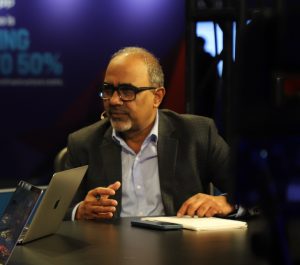 CLOUD
CLOUD
 CLOUD
CLOUD
 CLOUD
CLOUD
Private cloud has emerged as the defining strategy for enterprises navigating cost, governance and artificial intelligence integration, reshaping the balance between on-premises infrastructure and public cloud elasticity. The shift reflects a consolidation of services and a push toward efficiency as companies weigh how best to modernize legacy applications while preparing for AI-driven workloads.
At the center of this evolution are clear choices around streamlining services, reducing complexity and aligning ecosystems to support enterprise-scale adoption. The conversations in the industry now revolve around how VMware, under Broadcom Inc., is cutting excess, simplifying product lines and leaning into VMware Cloud Foundation 9.0 as the anchor for private cloud growth. While questions remain about developer engagement and long-term workload strategies, the overarching message is one of pragmatic consolidation, according to Sarbjeet Johal (pictured, right), founder and chief executive officer of Stackpane.

Stackpane’s Sarbjeet Johal talks to theCUBE about private cloud.
“I think my first impression is that there’s a lot of cleanup being done this year,” Johal said. “Long story short, Tanzu was talk of the town a couple of years back, and last year, well, Tanzu’s gone … they’re putting that under VCF 9.0. There’s a lot of cleanup and a lot of streamlining. The message was more crisp on the AI side this time.”
Johal spoke with theCUBE’s John Furrier (left) and Rebecca Knight (middle) at VMware Explore, during an exclusive broadcast on theCUBE, SiliconANGLE Media’s livestreaming studio. They discussed VMware’s consolidation under Broadcom, focusing on its private cloud strategy, simplification of services, ecosystem alignment and AI integration. (* Disclosure below.)
The emphasis on private cloud marks both a continuity and a pivot. Broadcom has doubled down on VCF as its core product, streamlining SKUs and positioning the platform as the enterprise’s foundation for AI readiness. This “back-to-basics” strategy reflects a desire to solidify VMware’s strongest capabilities while paring away distractions, Furrier explained.
“I think VMware is putting a stake in the ground,” he said. “They said last year, ‘I promise we’ll deliver value.’ They increase prices, they have to deliver the package. Now, their strategy is clear. I think the key for VMware is if they can get heat to certifications, that’s the tell sign. It’s like a report card. It’s a health check.”
The approach is not without friction. Smaller customers have expressed frustration with price increases and service reductions, while larger enterprises appear better positioned to benefit from the simplified model. The strategy, however, hinges on maintaining strong ties to the VMware community and ecosystem, particularly as certifications and skills adoption are seen as barometers of momentum, according to Johal.
“There was some bitterness in the beginning when the acquisition happened. First the clarity was not there when some information came in,” he added. “They shrunk the number of services and they repriced those services in a way that it is great for big customers, but it is not good for the lower end of the customers. They have mixed feelings.”
AI capabilities layered onto private cloud add another dimension. With offerings in model runtime, retrieval-augmented generation and agent building, VMware is positioning itself to meet enterprise AI demands where sovereignty, control and cost predictability are critical. The consolidation of services into a single VCF framework is designed to simplify adoption while maintaining flexibility for hybrid strategies.
“I think the dip last year, that was the bottom,” Furrier said. “If people are getting more certifications, that means they are creating more skills gravity, and we talk about skills gravity all the time. A vendor which has more skills gravity, they will win because they have more practitioners who are out there. For the companies which want to deploy that technology, that means they can get that sort of labor or know-how at a reasonable price.”
Here’s the complete video interview, part of SiliconANGLE’s and theCUBE’s coverage of VMware Explore:
(* Disclosure: TheCUBE is a paid media partner for VMware Explore. The sponsors of theCUBE’s event coverage do not have editorial control over content on theCUBE or SiliconANGLE.)
Support our mission to keep content open and free by engaging with theCUBE community. Join theCUBE’s Alumni Trust Network, where technology leaders connect, share intelligence and create opportunities.
Founded by tech visionaries John Furrier and Dave Vellante, SiliconANGLE Media has built a dynamic ecosystem of industry-leading digital media brands that reach 15+ million elite tech professionals. Our new proprietary theCUBE AI Video Cloud is breaking ground in audience interaction, leveraging theCUBEai.com neural network to help technology companies make data-driven decisions and stay at the forefront of industry conversations.